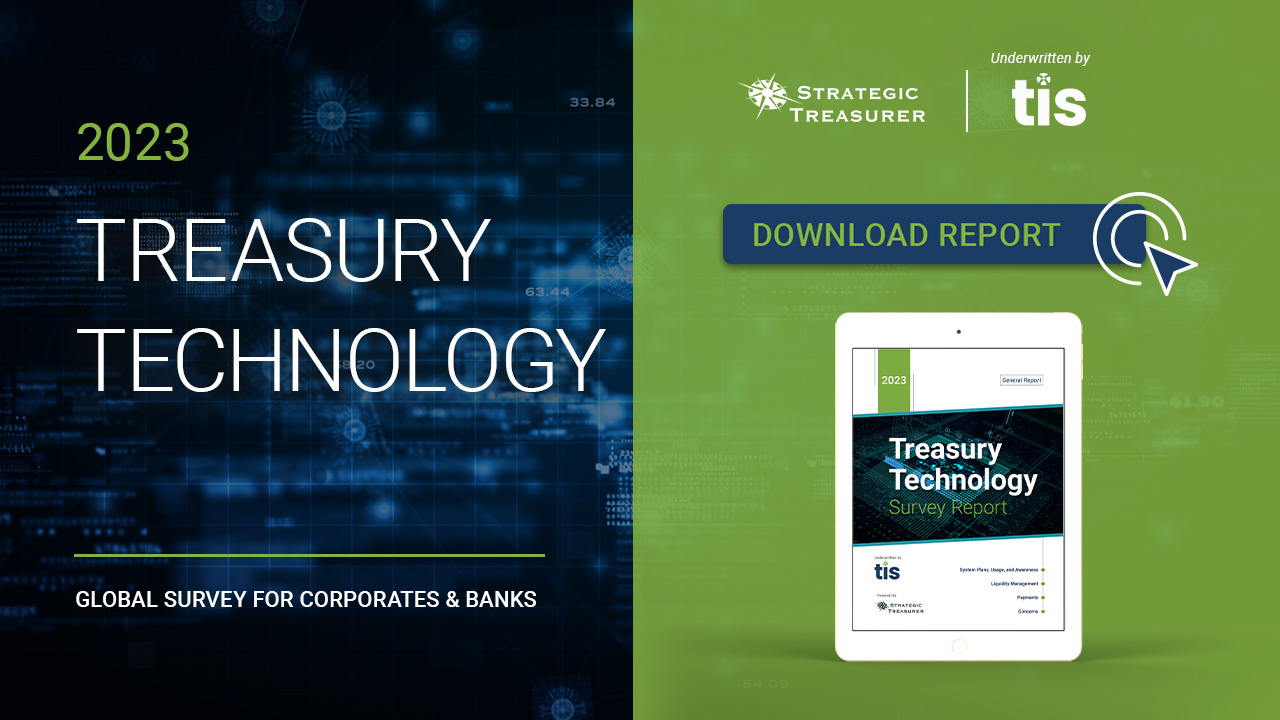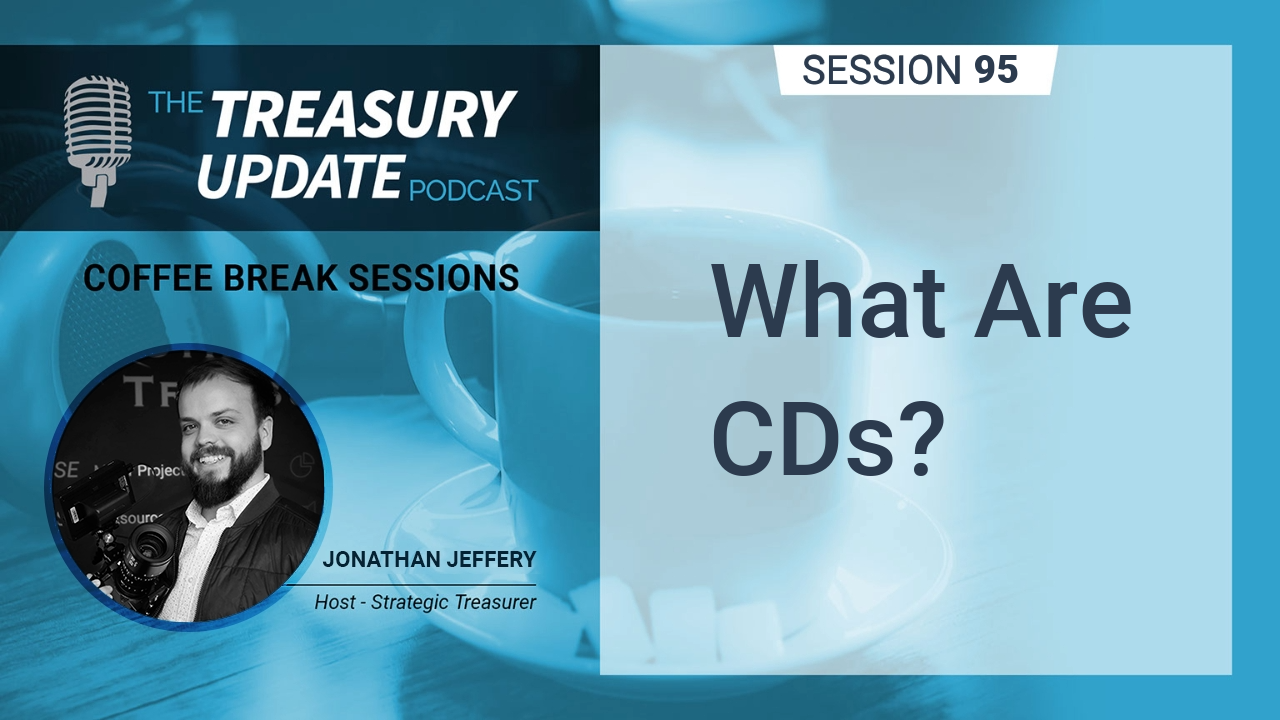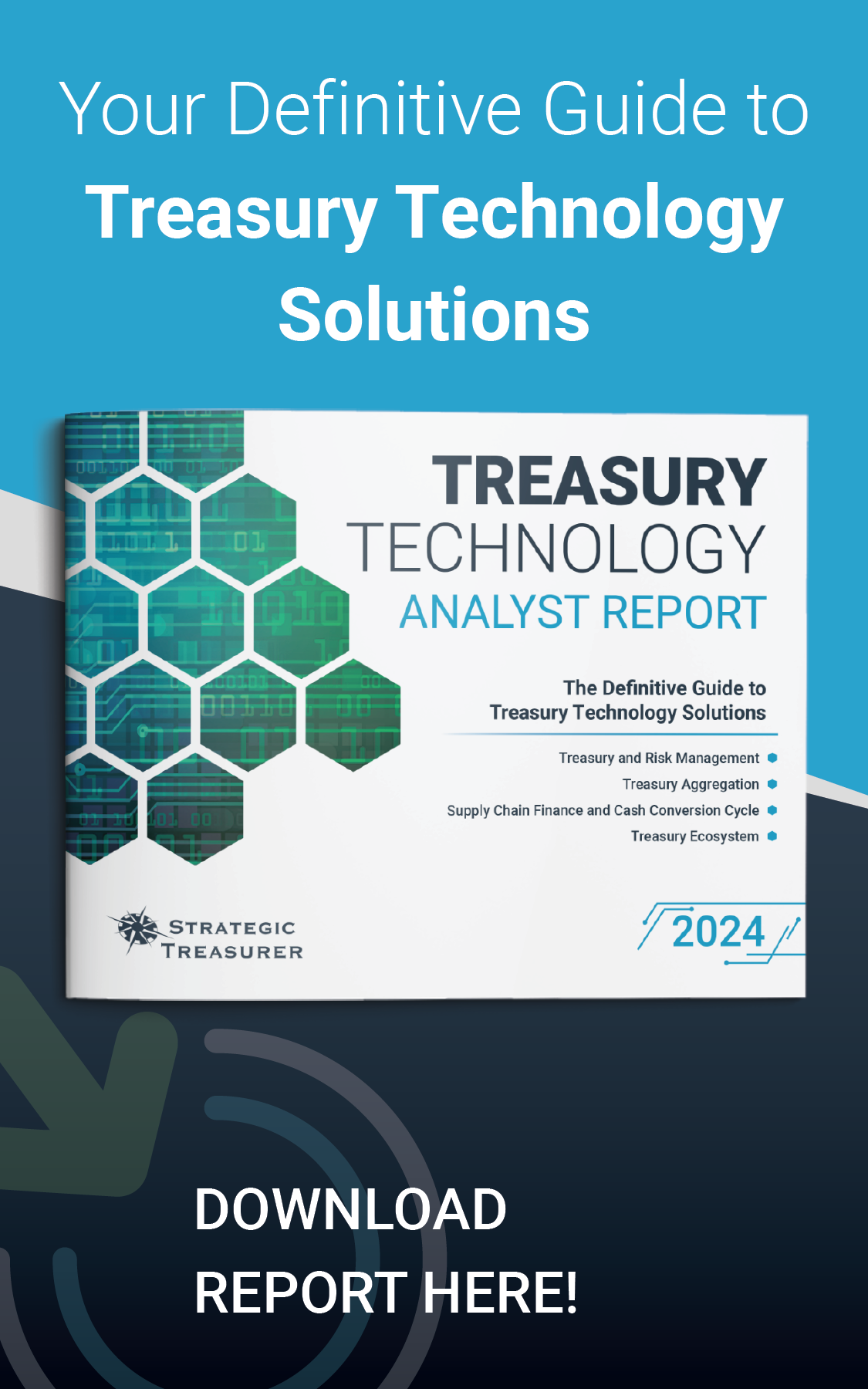
Session 97
What Are Brokered CDs?
In today’s episode, Paul Galloway, Senior Director, Advisory Services at Strategic Treasurer, shares a concise exploration of brokered CDs. You’ll learn what they are, how they differ from traditional CDs, the associated risks, what happens at maturity, tax considerations, and the option to sell them. Listen in for more information!
Host:
Jonathan Jeffery, Strategic Treasurer


Speaker:
Paul Galloway, Strategic Treasurer


Episode Transcription - (Coffee Break Session Series) - Episode 97 - What are Brokered CDs?
Jonathan Jeffery 00:02
Welcome to the Treasury Update Podcast Coffee Break Sessions presented by Strategic Treasurer, the show where we cover foundational topics and core treasury issues in about the same amount of time it takes you to drink your cup of coffee. I’ll be your host, Jonathan, media production specialist here at strategic treasure. So sit back, relax and enjoy the show. I am here with Paul Galloway. We are recording at AFP in person. Welcome back to the show. Paul, it’s been a little while since you’ve been on.
Paul Galloway 00:32
Yeah, it has, man. I’m glad to be back. Cool. Today on the Coffee Break Sessions, we’re going to be talking a little bit about brokered CD. So if you want to start us off with just telling the listeners what are brokered CDs? Yeah, so Jon, most people, when they talk about CDs, they might think about that go down to the local bank, or credit union. And they make an investment in a traditional what I call a traditional CD. And so banks offer certificates of deposit, as a way to get cash in the door to use for lending practices. And so that’s an incentive is, hey, if you bring in cash invested in a CD, we’re going to take that cash, and we’re going to invest it in the community, perhaps in the form of loans. And we’re going to get some kind of return back from that, well, we’re going to share the return with you in terms of an interest rate. And so that’s kind of how they determine where they’re going to set the interest rate. So we’re hoping that they’re going to be able to with expenses, and the loan rate outpaced what they’re going to pay you and make some money at the same time. So when it comes to like a brokered CD, it’s the same concept. It is a certificate of deposit. But these are actually traded through a brokerage firm. And so their CDs are traded in the secondary market, a little bit different than just investing in a CD at your local bank, the way I termed as a traditional CD. You went into how they’re different than your traditional CDs that you’re going to buy as an individual. What’s the process of purchasing a brokered CD? Who are they for? Yeah, so brokered CDs can be for individuals or institutions, companies, you know, or other organizations that are looking to make an investment with their cash. The way that you do that is you need to set up a brokerage account if you don’t already have one, so that you actually trade the CDs because they are traded across an exchange, and the second market, secondary market and you need a broker or broker, house broker dealer in order to execute those transactions. A great example of use of brokered CDs I sit on finance council and foundation board for my church. And we make investments in brokered CDs for our church. Part of the rationale behind doing that is that we wanted to make sure that we were spreading amongst different banks investments, instead of going to a bunch of individual local banks to get different CD so that we’re making sure we’re covered for FDIC insurance, which is 250,000. That’s the max of the coverage, anything above that, yeah, the potential to lose money. So we decided to go through a brokerage house to be able to do that, instead of going into a bunch of different banks. Okay, so there is more protection with a brokered CD? Well, there can be, you still have to make sure that you adhere to your limits in terms of the FDIC coverage itself. But with a brokered CD, you’re taking risk of market volatility, as rates change or demand for CDs, in particular, brokered, CDs may change as well. If a bank’s feeling pressure, you may potentially have some risks associated with loss of value. Add. So there’s two pieces that you’re trying to get out of a CD one, you’re trying to get the full return to your principal, say I invest $100,000 on purpose CD, again, an interest rate also tied to that. Well, I want to make sure I get both those back. And what I want to get the form out of my interest, I want to get back my principal associated with it. So you’re, you’re wanting to get both of those pieces back. But traded in the secondary market, kind of like a bond, the value can change. And there could be breakup fees associated with those as well. Okay, a breakup fee is that is that kind of like Craig was mentioning, with a regular CD you would, if you break the contract early, you’d lose some of your interest in possibly some of your principles that kind of the same idea. Yeah, same idea. Okay. Is there anything different? As far as your standard CD rules say like the breaking your contract early time limits? Is it all kind of the same from regular CDs to brokered CDs? Yeah, generally is, they’re the same. But, you know, there can be features associated with broker CDs that you might not get with your traditional CD at your bank or credit union that you invest in. They can be callable, there’s a call feature that allows the bank to repay the funds back to the investor. So there may be rationale as to why they’re doing that changes in rates, or there’s something else that’s going on where they want to return that capital back to the investor. And so they may call that. What are some of the other risks that are associated with brokered CDs? Here, the the main verse, we kind of talked about most of them. But you know, it’s when you make an investment in a CD, you’re making an investment in that bank. And so you’re banking on that the credit worthiness, we’ll just use that as the term credit worthiness of that bank is good, that they’re going to take deposits that they receive in, and they’re going to, for lack of a better term, I’ll call it make investments in the form of loans, they go out and they loan money to individuals, or to businesses. they’re banking on that those businesses that they’re making these investments, and those individuals will repay their loans and make their payments in a timely manner and not default on those. Sometimes they can make these investments in riskier loans. And so you heard about some of the disruption in the US we have banks that went under, when you looked at the balance sheet of these banks, if he had spent some time looking at the underlying investments that they made, the loans that are loan portfolio, you would would have found that there was some risks associated well, actually quite a bit of a risk for some of them, like Silicon Valley, there was a lot of risk that was on the balance sheet that wasn’t being taken into account because of the way that they had to report but somebody had dug into it and found out Oh, they got a bunch of risky loans. And what happens with banks is that if there’s any kind of mistrust along the way, it can totally damage the reputation of the bank, and you can get a run on the bank mean, all the depositors go to the bank to get their deposits back, because they’re worried that they’re gonna lose it. Likewise, with a broker CD, you’re taking that, on that credit of that bank, that you’re making the investment. And so it’s important to ensure, from an investor standpoint, that if something like that happens, that there is FDIC coverage to ensure that my deposit is safe. Yeah, you think of CDs as the most standard safe investment you can make. But there is still some risk there. There is not like investing in treasuries. And that is the ultimate safe haven is making investments in treasury bills or Treasury notes. That’s the ultimate safe haven that is viewed as the least risky investment that we can make is doing that. Okay. We’ll have to do a coffee break session on the safest and the most unsafe investments you can make. Make note. So what happens at the maturity of the brokered CD? Yeah, so what happens is the maturity of the broker CD is you get two things, you get your principal balance back to you. So that $100,000, we talked about in the example earlier, you get that back, but you also get interest. And so that’s an agreed upon terms associated with the CD. Typically, CDs are fixed rate investments, meaning you’ve agreed to terms of X number of months, you get this interest rate over that period, that gets all paid back to principal plus the interest. Yeah. And then are you we kind of talked about this a little bit. Are you able to sell your brokered CDs? You are you can sell those in the open market. They are tradable securities, and that’s why you have to set up a brokerage account and go through a broker dealer to buy or sell those CDs. So if you buy at a 12 month term, you could sell it in three months if you wanted to? Absolutely.
Jonathan Jeffery 09:40
Any fees?
Paul Galloway 09:42
Yeah, there’ll be a brokered fee there the brokerage house will charge you fees. There is potential risks that your value of that CD you may get less or more principal back potentially depending on what’s going on in the market since it is tradable. The value of those CDs can move. It sounds to me like it being tradable is one of the big benefits of a brokered CD. Yeah, it absolutely can be cool. Anything else you want to add about brokered CDs for the listeners? When you start making consideration in terms of the investment portfolio that you have, just make sure you understand the risks associated with making these transactions, these trades, and have a mechanism for ensuring that you have coverage of FDIC, making sure you understand the underlying risks associated with trading broker CDs. Understand the credit worthiness of the bank that you’re making an investment in. I got one more question actually. Is brokered CD as popular or more popular to purchase than just a regular CD from your bank? Or is are they not linked? Yeah, that’s, that’s a great question. I don’t know the answer to that. But I would say that they are equally popular in general, because they are there different ways to make the investments most people are acclimated to traditional, but people don’t understand that they can do brokered CDs, you know, that type of investment becomes common commonplace for some individuals, but also for institutions like I used the example of my church. We make investments in brokered CDs. Well, thanks so much for sharing your thoughts. In two weeks tune back in we’re going to be talking about callable CDs. So thanks for your thoughts and sharing this information, Paul. You bet, Jon. Thanks for having me.
Announcer 11:43
This podcast is provided for informational purposes only, and statements made by Strategic Treasurer LLC on this podcast are not intended as legal, business, consulting, or tax advice. For more information, visit and bookmark StrategicTreasurer.com.




